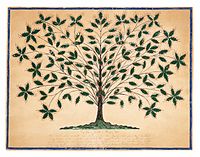Fruitlands Museums Historic District | |
 Fruitlands Museum | |
| Location | Harvard, Massachusetts |
|---|---|
| Coordinates | 42°29′37″N71°36′47″W / 42.49361°N 71.61306°W |
| Area | 210 acres (85 ha) |
| Built | 1910 |
| Architectural style | Shingle Style, Bungalow/Craftsman |
| NRHP reference No. | 97000439 [1] |
| Added to NRHP | May 23, 1997 |

 |
| Topics |
|---|
| Notable people |
Founders
Other members |
Fruitlands Museum in Harvard, Massachusetts, is a museum about multiple visions of America on the site of the short-lived utopian community, Fruitlands. The museum includes the Fruitlands farmhouse (a National Historic Landmark), a museum about Shaker life, an art gallery with 19th-century landscape paintings, vernacular American portraits, and other changing exhibitions, and a museum of Native American history. In 2023, readers of USA Today voted to name Fruitlands as one of the ten best history museums in the United States. [2]
Contents
Visitors can tour the farmhouse, which has been restored to appear as it did during the 1840s, and exhibits about Transcendentalism and the Alcott family. Fruitlands offers a diverse schedule of contemporary exhibits, lectures, outdoor concerts and easy walking trails. There is also a museum store and restaurant. The properties are overseen by The Trustees of Reservations.


